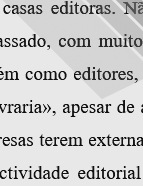

................................
However, although the collection came to an end in 1948 with the death of its director, Cosmos continued to publish in the following decades and played an important role in historiographical publishing (no longer purely from the point of view of dissemination but seeking to launch titles that were scientifically relevant to the field). Vitorino Magalhães Godinho played a key role in the selection of titles to be published, directing several collections (namely the Marcha da Humanidade [March of Humanity]) which, despite falling short of the success achieved by the Biblioteca Cosmos and its pace, enabled the publication of a significant number of works by important historians and sociologists, many of which were translated: Charles Morazé, Fernand Braudel and Georges Gurvitch.
Agostinho Fernandes (1886-1972), a patron and fishing and canning entrepreneur, founded Portugália Editora [ Portugália Publishing House] in 1942 with Pedro de Andrade and Raul Dias, the then owners of the Livraria Portugália [Portugália Bookshop], which would share its name with the new company. In the early years, under the leadership of Gaspar Simões, it was very dynamic but lost momentum when he left in 1946. It only recovered a decade later, with the fleeting involvement of Jorge de Sena and, above all, with the work of historian Augusto da Costa Dias (1919-1976), who replaced him and completely renewed the publisher's catalogue, making it one of the most important in the 1960s and investing in the publication of names opposed to the regime. Although the publishing house was geared more towards the field of literature, the Portugália collection in the area of history is remarkable, containing historians of great importance such as A. H. Oliveira Marques, Joel Serrão, Victor de Sá, Armando de Castro, António Borges Coelho and José Tengarrinha; and the Obras Completas de Jaime Cortesão [Complete Works of Jaime Cortesão] collection (later published by Livros Horizonte). (N. Medeiros, Idem, pp. 241-246.)
Despite being constantly harassed by the PIDE [International and State Defence Police] and censorship board, the Publicações Europa-América [Europe-America Publications] established itself between the 1950s and the 1970s as one of the country's most influential and fastest-growing publishing houses. It was founded in 1945 by Adelino Lyon de Castro, Manuel Rodrigues de Oliveira (who would leave the partnership), and Francisco Lyon de Castro (1914-2004) (who would become the publisher's chief executive and one of the most influential publishers of the following decades). Initially, the company's aim was to import books and journals, but in 1949 it redirected its business towards publishing. Before embarking on this path, Francisco Lyon de Castro had a very intense experience as a political activist. As a PCP militant since 1932, he was exiled in Madrid and Paris but returned to Portugal and was arrested in 1935.
